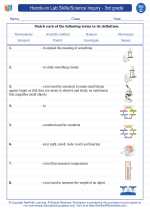Action Potential
An action potential is a rapid and transient change in the membrane potential of a cell, which is essential for the transmission of signals in the nervous system. This process is crucial for the communication between neurons and the generation of muscle contractions.
Key Concepts
- Resting Membrane Potential: The stable voltage across the plasma membrane of a neuron when it is not transmitting signals.
- Threshold: The level of depolarization required to trigger an action potential.
- Depolarization: The reversal of membrane potential from negative to positive, leading to the initiation of an action potential.
- Propagation: The transmission of action potentials along the axon of a neuron.
- Repolarization: The restoration of the membrane potential to its resting state after an action potential.
- Hyperpolarization: The brief period during which the membrane potential becomes more negative than the resting potential.
Process of Action Potential
When a neuron is at rest, it maintains a negative charge inside the cell compared to the outside. This is known as the resting membrane potential. When a stimulus causes the membrane potential to reach a certain threshold, voltage-gated ion channels open, allowing an influx of sodium ions. This influx depolarizes the membrane, triggering an action potential. The action potential propagates down the axon and causes the release of neurotransmitters at the synapse.
Study Guide
Here are some key points to remember when studying action potentials:
- What is the resting membrane potential and how is it maintained?
- What is the role of voltage-gated ion channels in the generation of action potentials?
- Describe the sequence of events during the depolarization, repolarization, and hyperpolarization phases of an action potential.
- How does an action potential propagate along the axon?
- What is the significance of action potentials in neural communication?
Understanding the process of action potential is fundamental to grasping the functioning of the nervous system and is crucial for further studies in neuroscience and physiology.
.◂Science Worksheets and Study Guides Third Grade. Hands-on Lab Skills/Science Inquiry - 3rd grade
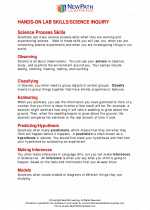
 Worksheet/Answer key
Worksheet/Answer key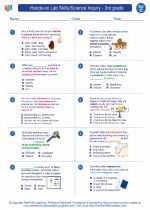
 Worksheet/Answer key
Worksheet/Answer key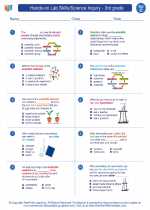
 Worksheet/Answer key
Worksheet/Answer key
 Worksheet/Answer key
Worksheet/Answer key
 Vocabulary/Answer key
Vocabulary/Answer key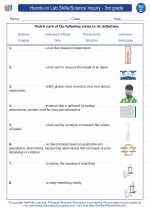
 Vocabulary/Answer key
Vocabulary/Answer key